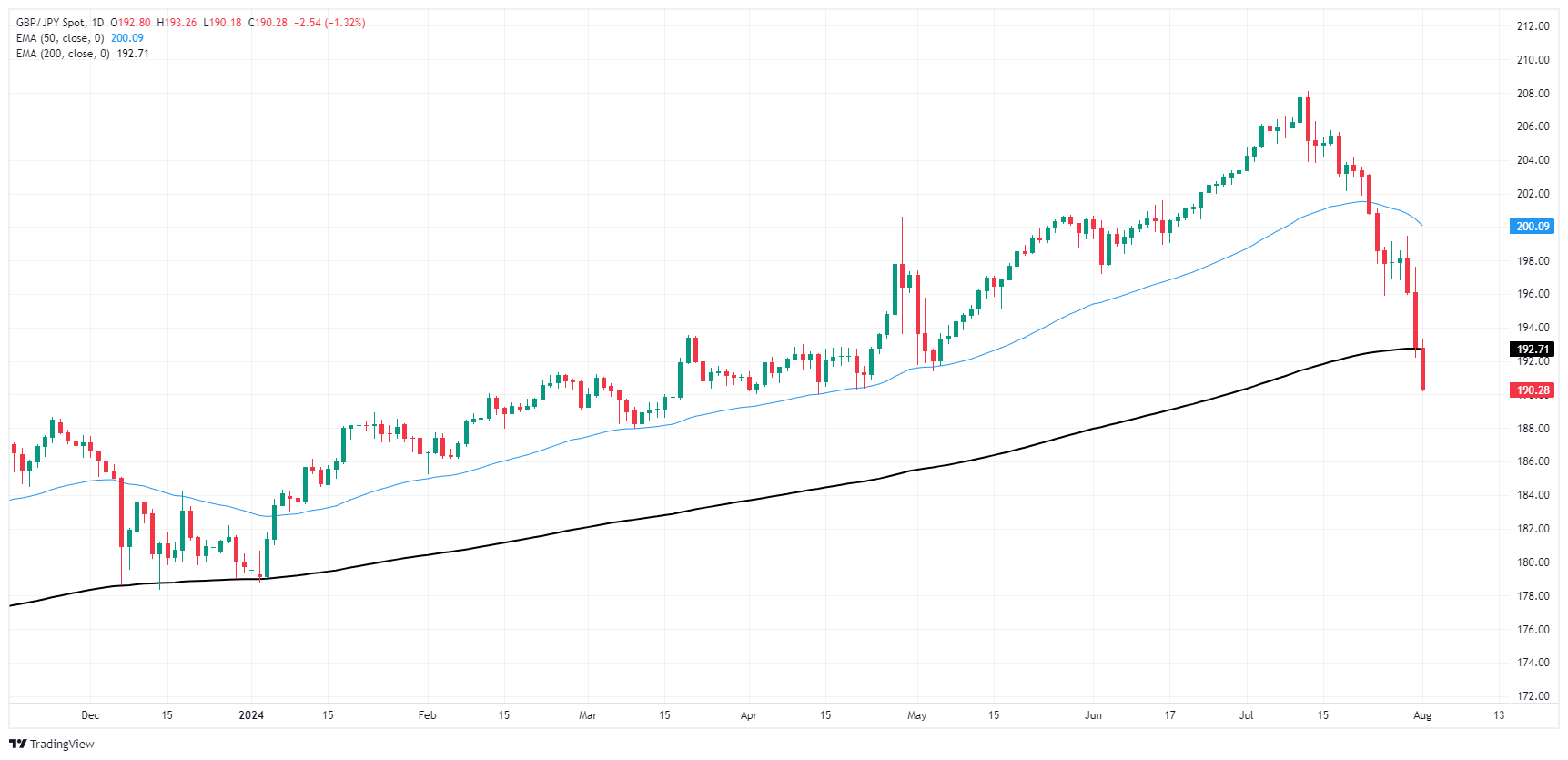- Analytics
- News and Tools
- Market News
- GBP/JPY continues downside rebalance after rate differential changes course
GBP/JPY continues downside rebalance after rate differential changes course
- GBP/JPY eased to 190.30 on Thursday following an expected BoE rate cut.
- The BoE trimmed interest rates by a quarter-point, while BoJ raised.
- After a structural shift in the Guppy’s rate differential, the GBP is declining.
The Guppy declined to 190.30 on Thursday after a downward shift in the Bank of England’s (BoE) main reference rates helped to trim the top off of the GBP/JPY’s wide interest rate differential, giving the Yen a chance to recover ground and pushing down the Pound Sterling.
The BoE trimmed its interest rate by 25 basis points to a flat 5.0% early Thursday, deflating the GBP and sending GBP/JPY into a 16-week low near 190.25. This follows the Bank of Japan’s (BoJ) own rate hike earlier in the week, dragging Japanese interest rates back into positive territory above 0.1% for the first time since 2010.
Guppy is undergoing a hard rebalance following a trimming of the rate differential between the GBP and the Yen, and the upcoming trading week provides a reprieve from key economic data for both currencies. The data docket for both the UK and Japan is strictly mid-tier next week, and UK labor figures are not due until mid-August.
GBP/JPY technical outlook
The Guppy is on pace to chalk in a fourth straight down week as bearish momentum accelerates into the low end, dragging the pair further back from 16-year highs just above 208.00. The pair is easing back towards 190.00, but despite a -8.62% decline from multi-year peaks, a long-run bull market leaves price action buried deep in bull country with bids still swimming over 11% above the 200-day Exponential Moving Average (EMA) at 171.07.
GBP/JPY daily chart
Pound Sterling FAQs
The Pound Sterling (GBP) is the oldest currency in the world (886 AD) and the official currency of the United Kingdom. It is the fourth most traded unit for foreign exchange (FX) in the world, accounting for 12% of all transactions, averaging $630 billion a day, according to 2022 data. Its key trading pairs are GBP/USD, aka ‘Cable’, which accounts for 11% of FX, GBP/JPY, or the ‘Dragon’ as it is known by traders (3%), and EUR/GBP (2%). The Pound Sterling is issued by the Bank of England (BoE).
The single most important factor influencing the value of the Pound Sterling is monetary policy decided by the Bank of England. The BoE bases its decisions on whether it has achieved its primary goal of “price stability” – a steady inflation rate of around 2%. Its primary tool for achieving this is the adjustment of interest rates. When inflation is too high, the BoE will try to rein it in by raising interest rates, making it more expensive for people and businesses to access credit. This is generally positive for GBP, as higher interest rates make the UK a more attractive place for global investors to park their money. When inflation falls too low it is a sign economic growth is slowing. In this scenario, the BoE will consider lowering interest rates to cheapen credit so businesses will borrow more to invest in growth-generating projects.
Data releases gauge the health of the economy and can impact the value of the Pound Sterling. Indicators such as GDP, Manufacturing and Services PMIs, and employment can all influence the direction of the GBP. A strong economy is good for Sterling. Not only does it attract more foreign investment but it may encourage the BoE to put up interest rates, which will directly strengthen GBP. Otherwise, if economic data is weak, the Pound Sterling is likely to fall.
Another significant data release for the Pound Sterling is the Trade Balance. This indicator measures the difference between what a country earns from its exports and what it spends on imports over a given period. If a country produces highly sought-after exports, its currency will benefit purely from the extra demand created from foreign buyers seeking to purchase these goods. Therefore, a positive net Trade Balance strengthens a currency and vice versa for a negative balance.
© 2000-2026. All rights reserved.
This site is managed by Teletrade D.J. LLC 2351 LLC 2022 (Euro House, Richmond Hill Road, Kingstown, VC0100, St. Vincent and the Grenadines).
The information on this website is for informational purposes only and does not constitute any investment advice.
The company does not serve or provide services to customers who are residents of the US, Canada, Iran, The Democratic People's Republic of Korea, Yemen and FATF blacklisted countries.
Making transactions on financial markets with marginal financial instruments opens up wide possibilities and allows investors who are willing to take risks to earn high profits, carrying a potentially high risk of losses at the same time. Therefore you should responsibly approach the issue of choosing the appropriate investment strategy, taking the available resources into account, before starting trading.
Use of the information: full or partial use of materials from this website must always be referenced to TeleTrade as the source of information. Use of the materials on the Internet must be accompanied by a hyperlink to teletrade.org. Automatic import of materials and information from this website is prohibited.
Please contact our PR department if you have any questions or need assistance at pr@teletrade.global.















